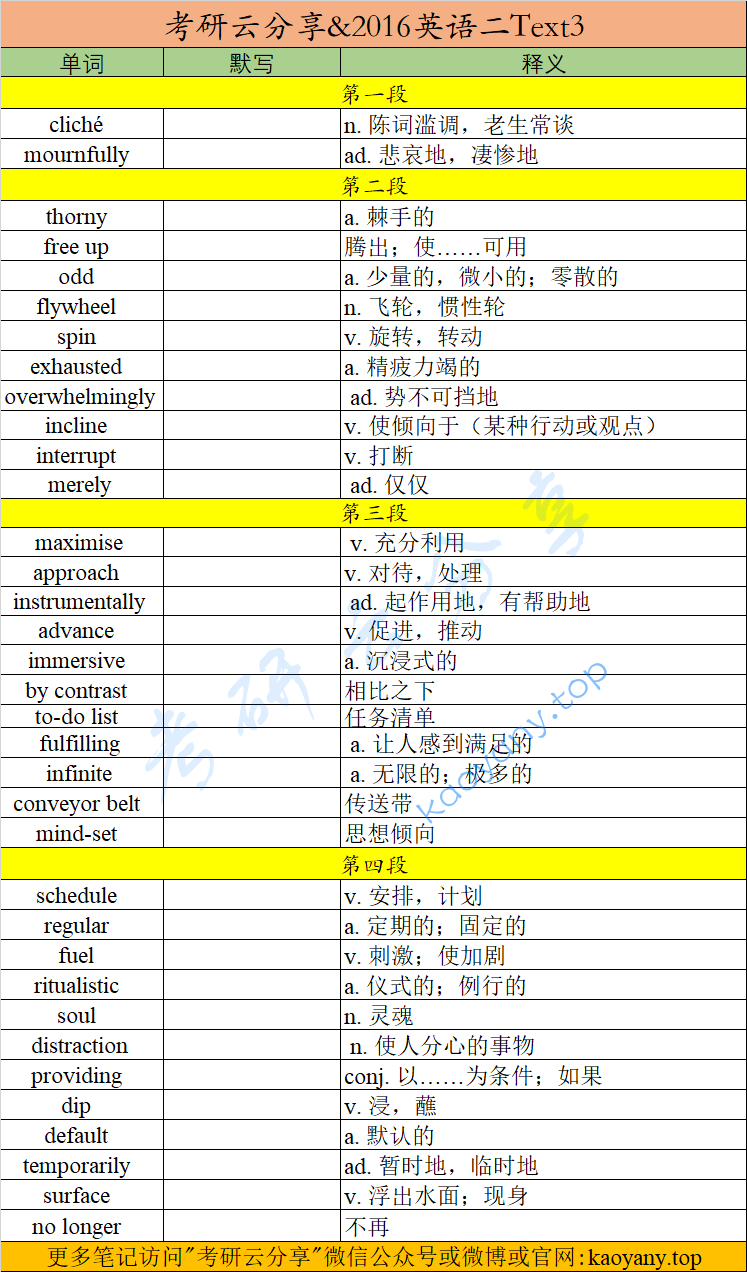第一段
That everyone’s too busy these days is a cliché. But one specific complaint is made especially mournfully: There’s never any time to read.
单词&词组
cliché n. 陈词滥调,老生常谈
mournfully ad. 悲哀地,凄惨地
本段翻译
如今人人都抱怨自己很忙,这已屡见不鲜。但有一项抱怨听起来尤为让人伤感:一直没时间阅读。
第二段
What makes the problem thornier is that the usual time-management techniques don’t seem sufficient. The web’s full of articles offering tips on making time to read: “Give up TV” or “Carry a book with you at all times” But in my experience, using such methods to free up the odd 30 minutes doesn’t work. Sit down to read and the flywheel of work-related thoughts keeps spinning-or else you’re so exhausted that a challenging book’s the last thing you need. The modern mind, Tim Parks, a novelist and critic, writes, “is overwhelmingly inclined toward communication…It is not simply that one is interrupted; it is that one is actually inclined to interruption”. Deep reading requires not just time, but a special kind of time which can’t be obtained merely by becoming more efficient.
单词&词组
thorny a. 棘手的
free up 腾出;使……可用
odd a. 少量的,微小的;零散的
flywheel n. 飞轮,惯性轮
spin v. 旋转,转动
exhausted a. 精疲力竭的
overwhelmingly ad. 势不可挡地
incline v. 使倾向于(某种行动或观点)
interrupt v. 打断
merely ad. 仅仅
本段翻译
而让这个问题更糟糕的是,那些常见的时间管理技巧似乎并不足以改变这一问题。网上充斥各种教你如何挤出时间来阅读的攻略,如:“别看电视”或“时刻带本书在身上”。但以我的经验来看,用这些方法来挤出个30分钟左右的阅读时间并不奏效。因为当你坐下看书的时候,脑海里各种关于工作的思绪就开始翻腾,或是你太疲倦了以致于你最不想做的就是读一本对你来说比较吃力的书。小说家和批评家提姆·帕克斯写道:“当代人的心理极其偏向于交流……并不仅仅是说你被打扰了而是你实际上很容易被打扰。”深度阅读需要的不仅仅是时间,而是一种特别的时间,它不是仅仅通过提高效率就能获得的。
第三段
In fact, “becoming more efficient” is part of the problem. Thinking of time as a resource to be maximised means you approach it instrumentally, judging any given moment as well spent only in so far as it advances progress toward some goal immersive reading, by contrast, depends on being willing to risk inefficiency, goallessness, even time-wasting. Try to slot it as a to-do list item and you’ll manage only goal-focused reading-useful, sometimes, but not the most fulfilling kind. “The future comes at us like empty bottles along an unstoppable and nearly infinite conveyor belt,” writes Gary Eberle in his book Sacred Time, and “we feel a pressure to fill these different-sized bottles (days, hours, minutes)as they pass, for if they get by without being filled, we will have wasted them”. No mind-set could be worse for losing yourself in a book.
单词&词组
maximise v. 充分利用
approach v. 对待,处理
instrumentally ad. 起作用地,有帮助地
advance v. 促进,推动
immersive a. 沉浸式的
by contrast 相比之下
to-do list 任务清单
fulfilling a. 让人感到满足的
infinite a. 无限的;极多的
conveyor belt 传送带
mind-set 思想倾向
本段翻译
事实上,“提高效率”只是解决没时间阅读这一问题的一方面。如果能把时间看做是一种可被最大化利用的资源,那就意味着你能把它当做工具来用,并且只有在你时时刻刻都向特定目标迈进的时候,你才认为每一刻时间都用得所值。相反,深度阅读取决于你愿意承担无效率、无目标地阅读所带来的后果,这种阅读后果甚至是浪费时间。如果你能把阅读列为你每天必做事项之一,那么你就能做到专一于目标的阅读—这种方式有时候很管用,但它并不是让人最有充实感的阅读方式。“传送带停不下来且似乎无止尽,这让我们感到一种压力,那就是不同大小的瓶子在传送带上经过的时候要把它们都填满,因为如果瓶子没有被填满就下了传送带,我们就浪费了这些瓶子。我们的未来又何尝不是传送带上的瓶子呢?”加里·埃伯利在他的《神圣的时间》一书中这样写道。没有哪种心境能比沉浸书海这种感觉更好。
第四段
So what does work? Perhaps surprisingly, scheduling regular times for reading. You’d think this might fuel the efficiency mind-set, but in fact, Eberle notes, such ritualistic behaviour helps us “step outside time’s flow” into “soul time”. You could limit distractions by reading only physical books, or on single-purpose e-readers. “Carry a book with you at all times” can actually work, too-providing you dip in often enough, so that reading becomes the default state from which you temporarily surface to take care of business, before dropping back down. On a really good day, it no longer feels as if you’re “making time to read,” but just reading, and making time for everything else.
单词&词组
schedule v. 安排,计划
regular a. 定期的;固定的
fuel v. 刺激;使加剧
ritualistic a. 仪式的;例行的
soul n. 灵魂
distraction n. 使人分心的事物
providing conj. 以……为条件;如果
dip v. 浸,蘸
default a. 默认的
temporarily ad. 暂时地,临时地
surface v. 浮出水面;现身
no longer 不再
本段翻译
那么什么有效呢?也许令人惊讶的是,定期安排阅读时间。你可能认为这可能会助长效率思维定势,但事实上,埃伯勒指出,这种仪式性行为帮助我们“走出时间的流动”进入“灵魂时间”。你可以通过只看实体书或单用途电子阅读器来限制分心。“时刻随身携带一本书”实际上也能起作用,只要你足够频繁地参与其中,那么阅读就成了你暂时浮出水面处理业务的默认状态,然后再放下手头的工作。在一个非常好的日子里,你不再觉得自己是在“挤出时间读书”,而只是读书,为其他事情腾出时间。
五道题
31. The usual time-management techniques don’t work because___.
[A] what they can offer does not ease the modern mind
[B] what challenging books demand is repetitive reading
[C] what people often forget is carrying a book with them
[D] what deep reading requires cannot be guaranteed
32. The “empty bottles” metaphor illustrates that people feel a pressure to___.
[A] update their to-do lists
[B] make passing time fulfilling
[C] carry their plans through
[D] pursue carefree reading
33. Eberle would agree that scheduling regular times for reading helps___.
[A] encourage the efficiency mind-set
[B] develop online reading habits
[C] promote ritualistic reading
[D] achieve immersive reading
34. “Carry a book with you at all times” can work if___.
[A] reading becomes your primary business of the day
[B] all the daily business has been promptly dealt with
[C] you are able to drop back to business after reading
[D] time can be evenly split for reading and business
35. The best title for this text could be___.
[A] How to Enjoy Easy Reading
[B] How to Find Time to Read
[C] How to Set Reading Goals
[D] How to Read Extensively
参考答案
DBDAB
答案解析
31、由题干中的the usual time- management techniques 定位至第二段。③句指出:这些方法(即上述时间管理技巧)都不可行;随后阐释原因,⑥句总结根本原因:实现深度阅读需要的不只是“(普通)时间”,而是一种仅凭提高效率无法获得的“特殊时间”,也就是说,常规的时间管理技巧虽然有助于提高效率,但这样挤出来的时间有别于“特殊时间”,不能满足深度阅读所需,因此[D]正确。
32、由题干中的"empty bottles定位至第三段。⑤句首先介绍“空瓶子”的隐喻:“未来”好比“沿着传送带不断向我们走来的空瓶子”继而说明现代人的心态:迫切地想把这些(象征“时间”的)瓶子装满.否则就是虚度光阴,也即、人们每天都因“想把时间安排得满满当当"而备受压力,[B]选项正确。
33、根据题干中scheduling regular times for reading 定位至第四段。首句提出问题:究竟怎样的时间管理方式对阅读来说才有效?随后作答:为阅读安排固定时间段。③句借Eberle 观点说明这样行事( such ritualistic behavior指“固定时间阅读”)的作用:有助于人们挣脱“时间的流逝”,进人“灵魂时间”,联系第三段③至⑤句即为:不再为浪费时间而惶恐,实现纯粹的沉浸式阅读,因此[D]正确。
34、根据题干可定位至第四段⑤句,句中破折号引出“随身携带一本书”起作用的条件(providing作连词,意为“如果”):能经常沉浸于书中,阅读成为默认状态,而其他事务则变为附带,也即,阅读成为高于其他事务的首要事务,[A]正确。
35、第一段提出问题 :如今人们总抱怨没有时间阅读。第二、三段分析问题:阐释常见时间管理技巧在阅读问题上不可行的根本原因。第四段提出建议:安排固定的时间段来阅读,把阅读当作“主业”,其他事务当作“副业”。可见全文针对“现代人烦恼没有时间阅读”提出可行性办法,[B]正确。

- 单词 词组
- 本段翻译
- 单词 词组
- 本段翻译
- 单词 词组
- 本段翻译
- 单词 词组
- 本段翻译
- 参考答案
- 答案解析
